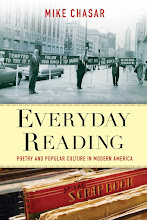 Breaking News: "Poetry & Popular Culture" has just learned, from sources sorta close to the Biden campaign, that the vice-presidential nominee's favorite poem may well be Seamus Heaney's "The Cure at Troy" (Heaney's translation of "The Philoctetes" by Sophocles) and especially the lines in the third stanza below which Biden has repeatedly quoted:
Breaking News: "Poetry & Popular Culture" has just learned, from sources sorta close to the Biden campaign, that the vice-presidential nominee's favorite poem may well be Seamus Heaney's "The Cure at Troy" (Heaney's translation of "The Philoctetes" by Sophocles) and especially the lines in the third stanza below which Biden has repeatedly quoted:Human beings suffer,
They torture one another,
They get hurt and get hard.
No poem or play or song
Can fully right a wrong
Inflicted and endured.
The innocent in gaols
Beat on their bars together.
A hunger-striker's father
Stands in the graveyard dumb.
The police widow in veils
Faints at the funeral home.
History says, don't hope
On this side of the grave.
But then, once in a lifetime
The longed-for tidal wave
Of justice can rise up,
And hope and history rhyme.
So hope for a great sea-change
On the far side of revenge.
Believe that further shore
Is reachable from here.
Believe in miracle
And cures and healing wells.
Call miracle self-healing:
The utter, self-revealing
Double-take of feeling.
If there's fire on the mountain
Or lightning and storm
And a god speaks from the sky
That means someone is hearing
The outcry and the birth-cry
Of new life at its term.
 What's the appeal for Biden? While "Poetry & Popular Culture" has been unable to reach Barack Obama's running mate himself, our source sorta close to Biden comments: "I think Heaney's poem taps into the growing sense of frustration that this country feels, knowing our past flirtations with rebelling against inept power. And I think this poem is appropriate for Joe and Barack because together they represent hope and history."
What's the appeal for Biden? While "Poetry & Popular Culture" has been unable to reach Barack Obama's running mate himself, our source sorta close to Biden comments: "I think Heaney's poem taps into the growing sense of frustration that this country feels, knowing our past flirtations with rebelling against inept power. And I think this poem is appropriate for Joe and Barack because together they represent hope and history."Go team.
 It's interesting to note that while Biden attaches himself to Nobel Prize-winning Heaney, and while Obama was once friends with politcal poet and civil rights activist Frank Marshall Davis, John McCain's choice verse might well be William Ernest Henley's 1875 poem "Invictus." Indeed, writing for The New York Times on January 21, 2008, William Kristol reported that McCain had to memorize Henley's verse in school and still has it by heart. For Kristol, McCain's affinity for Victorian-era poetry suggests that McCain himself is "not thoroughly modern"—as if the Original Maverick's inability to use email and the internet weren't evidence enough. "John McCain," Kristol writes, "Is a not so modern man. One might call him a neo-Victorian—rigid, self-righteous and moralizing, but (or rather and) manly, courageous and principled." "Invictus" ends:
It's interesting to note that while Biden attaches himself to Nobel Prize-winning Heaney, and while Obama was once friends with politcal poet and civil rights activist Frank Marshall Davis, John McCain's choice verse might well be William Ernest Henley's 1875 poem "Invictus." Indeed, writing for The New York Times on January 21, 2008, William Kristol reported that McCain had to memorize Henley's verse in school and still has it by heart. For Kristol, McCain's affinity for Victorian-era poetry suggests that McCain himself is "not thoroughly modern"—as if the Original Maverick's inability to use email and the internet weren't evidence enough. "John McCain," Kristol writes, "Is a not so modern man. One might call him a neo-Victorian—rigid, self-righteous and moralizing, but (or rather and) manly, courageous and principled." "Invictus" ends:It matters not how straight the gate,
How charged with punishments the scroll,
I am the master of my fate:
I am the captain of my soul.
"Poetry & Popular Culture" now eagerly awaits McCain's choice of running mates. What shall his or her poetic preferences be?

















